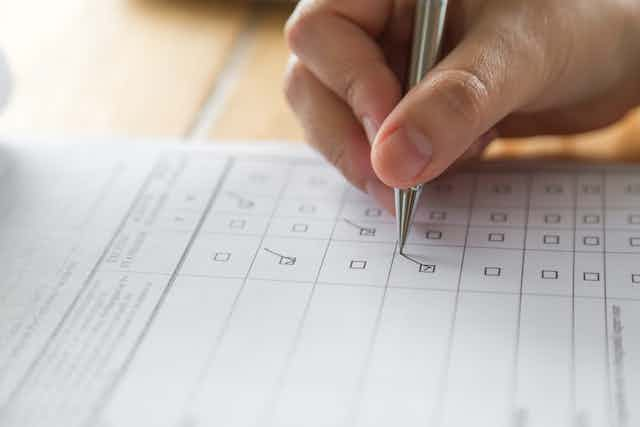Autism has been a subject of ever increasing interest over the last 20 years. It has been the subject of popular TV shows, novels and numerous studies looking at everything from sensory experiences to mental health in autism. As a result, there is a growing need for efficient and reliable ways to measure autism levels.
The most popular way of doing this is by using questionnaires of autism personality traits. There are several tests available, in which participants are asked to rate how much they agree with statements like “I find it easy to work out what someone is thinking or feeling just by looking at their face” and “I find it difficult to work out people’s intentions”.
These tests are routinely used by doctors and researchers. This is partly because they can be completed quickly, enabling efficient clinical assessment and allowing people to take part in autism research without too much hassle. The tests are also found online and used by people to understand autistic traits, but they are sometimes mistaken as diagnostic tools.
In research, autism personality trait measures are commonly used to investigate autistic traits in the population and whether or not they relate to other psychological traits. Recently, for example, autism personality trait tests were used to investigate how autism relates to empathy in the general population.
Read more: Autism is linked to lower levels of empathy – but that may not be a bad thing
One common questionnaire – used by doctors and researchers – is the “10-item autism-spectrum quotient (AQ-10)”. The AQ-10 comprises ten statements like those mentioned above, with participants asked to state how much they agree or disagree.
The UK’s National Institute for Health and Care Excellence (Nice), a government body that gives guidance to the NHS, recommends the AQ-10 as a screening tool for autism in adults. It is also widely used in online psychological and clinical research.
But despite the popularity of the AQ-10 test, little research has been done to find out if the test has good “psychological reliability”. This can be measured by seeing how well the questions in the test are linked to each other and by testing whether it is measuring one thing – autism – or just a mix of several different things, such as empathy and attention to detail.
To address these questions, a new study by our research group analysed responses to the AQ-10 from over 6,500 people who had completed the test online.
Improvement needed
Using advanced statistical analyses, we found that the AQ-10 lacks reliability as a measure of autism personality traits. Most of its questions did not hang well together, which is not ideal as the total scores are being used in research. Additional analyses suggested that the test was possibly measuring several psychological processes and behaviours – not just autism.

The results of the study raise questions about whether it is appropriate to use the AQ-10. It might be useful as a screening tool for doctors, but researchers should examine its reliability when using it in future. The public should also be careful when completing online autism personality tests, which may be unreliable, outdated and misleading.
Our findings contribute to a growing awareness that many psychological methods used in autism research need to be improved. We analysed just one of many autism questionnaires. It is clear that we need more studies to see if other autism tests have similar issues.
This is important because issues with autism personality tests may be slowing down research, confusing doctors and misleading the public about autism. It is crucial that we continue doing research to study and refine autism personality questionnaires, which will be important for the continued improvement in understanding and supporting people with autistic traits and diagnosed autism in society.

